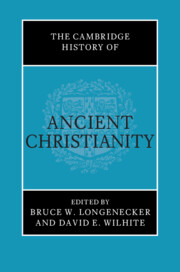Book contents
- The Cambridge History of Ancient Christianity
- The Cambridge History of Ancient Christianity
- Copyright page
- Contents
- Figures
- List of Contributors
- Editors’ Preface
- Part I Contested Contexts
- Part II Contested Figures
- 5 Remembering Jesus in Earliest Christianity
- 6 Remembering Jesus in the Second and Third Centuries CE
- 7 Paul and His Diverse Champions
- 8 Peter and His Diverse Champions
- Part III Contested Heritage
- Part IV Contested Cultures
- Part V Contested Beliefs
- Part VI Contested Bodies
- Ancient Sources
- Modern Authors
- References
6 - Remembering Jesus in the Second and Third Centuries CE
from Part II - Contested Figures
Published online by Cambridge University Press: 23 August 2023
- The Cambridge History of Ancient Christianity
- The Cambridge History of Ancient Christianity
- Copyright page
- Contents
- Figures
- List of Contributors
- Editors’ Preface
- Part I Contested Contexts
- Part II Contested Figures
- 5 Remembering Jesus in Earliest Christianity
- 6 Remembering Jesus in the Second and Third Centuries CE
- 7 Paul and His Diverse Champions
- 8 Peter and His Diverse Champions
- Part III Contested Heritage
- Part IV Contested Cultures
- Part V Contested Beliefs
- Part VI Contested Bodies
- Ancient Sources
- Modern Authors
- References
Summary
In this chapter I consider some of the ways in which Jesus was remembered or commemorated in the second and third centuries ce, and how recent scholarship has addressed this issue. In this context, the use of the verb “remember” points to the significance of social or collective or cultural memory1 as the means by which individuals and communities understand both their present identity and the past that has helped to shape it. Such memory may extend over significant periods of time, as noted by Jan Assmann, who uses the category “cultural memory” to refer to a process made possible by written texts and ritual performance, and therefore neither dependent on the product of individual neurobiological memory orally transmitted (“communicative memory”) nor limited by any need for living contacts with eyewitnesses to past events.2 This category enables Assmann to explain how societies pass on foundational memories beyond the period of “communicative memory” with the original participants or eyewitnesses (which he considers to be 80–100 years or three to four generations). It is therefore readily applicable to the period studied here, in which authors of the second and third centuries ce draw on written sources and on “memory formulas and configurations that underpin [their] sense of community and … the memory needs of a clearly defined ‘we’” by means of which they construct and transmit their socially conditioned memories of Jesus.3
- Type
- Chapter
- Information
- The Cambridge History of Ancient Christianity , pp. 130 - 153Publisher: Cambridge University PressPrint publication year: 2023

